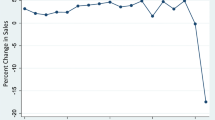Abstract
This article examines public policy and social welfare issues related to a recent trend in black business ownership: the decline of black-owned businesses in ‘traditional’ personal services serving a predominantly black clientele, and the corresponding increase of black-owned businesses in ‘emerging’ capital- and knowledge-intensive fields. It is argued that, while the growth of black business ownership in emerging fields is a sign of black economic progress, overall trends in black business ownership are not entirely positive. For one thing, the divergent trends in traditional and emerging black-owned firms reflect widening socioeconomic disparities within black communities. Moreover, the decline of traditional black-owned firms bodes ill for disadvantaged blacks in inner-cities. After reviewing the development of black business enterprise in the United States, trends in black business ownership since the 1970s are examined. Patterns of change in traditional personal services and emerging business services are then linked to social and economic transformations that have enabled many blacks to participate in the larger national economy. The article concludes by discussing the implications of declines in traditional black businesses for black well-being and for public policy.
Similar content being viewed by others
References
Bates, T. (1978). ‘Profitability in traditional and emerging lines of black enterprise’,Journal of Urban Economics 5: 155–159.
Bates, T. (1983). The potential for black business: a comment,Review of Black Political Economy 12: 237–240.
Bates, T. (1989a). ‘The changing nature of minority business: a comparative analysis of Asian, nonminority, and black-owned businesses’,Review of Black Political Economy 18: 25–42.
Bates, T. (1989b). ‘Small business viability in the urban ghetto’,Journal of Regional Science 29: 625–643.
Bluestone, B. (1969). ‘Black capitalism: the path to black liberation’,Review of Radical Political Economics 1: 36–55.
Boyd, R.L. (1989).Ethnic Entrepreneurs in the New Economy: Business Enterprise Among Blacks and Asian Americans in a Changing Urban Environment. Ph.D. Dissertation, Department of Sociology, University of North Carolina, Chapel Hill.
Brimmer, A. (1971). ‘Small business and economic development in the Negro community’, in R.W. Bailey (ed.),Black Enterprise: Historical and Contemporary Perspectives. New York: Basic Books.
Brimmer, A. and H.S. Terrell (1971). ‘The economic potential of black capitalism’,Public Policy 19: 289–308.
Chen, G. (1984). ‘Business formation and investment in the minority community’, in R.D. Bingham and J.P. Blair (eds.),Urban Economic Development. Beverly Hills, California: Sage Publications.
Drake, S.C. and H. Clayton (1962).Black Metropolis. New York: Harcourt, Brace and Company.
Du Bois, W.E.B. (1899).The Philadelphia Negro. Philadelphia: University of Pennsylvania Press.
Fain, T.S. (1980). ‘Self-employed Americans: their number has increased’,Monthly Labor Review 103: 3–8.
Farley, R. (1984).Blacks and Whites: Narrowing the Gap? Cambridge, Massachusetts: Harvard University Press.
Frazier, E.F. (1925). ‘Durham: capital of the black middle class’, in Alain Locke (ed.),The New Negro. New York: Albert and Charles Boni.
Frazier, E.F. (1957).Black Bourgeoisie. New York: Macmillan.
Green, L. and C.G. Woodson (1930)The Negro Wage Earner. New York: Russell and Russell.
Harris, A.L. (1936).The Negro as a Capitalist. Philadelphia: American Academy of Political and Social Science.
Katzman, D.M. (1973).Before the Ghetto: Black Detroit in the Nineteenth Century. Chicago: University of Illinois Press.
Kinser, R.H. and E. Sagarin. (1950).The Negro Businessman: The Conflict Between Separatism and Integration. New York: Greenberg Press.
Kotkin, J. (1986). ‘The reluctant entrepreneurs’,INC. 8: 81–86.
Kusmer, K.L. (1976).A Ghetto Takes Shape: Black Cleveland, 1870–1930. Chicago: University of Chicago Press.
Landry, B. (1987).The New Black Middle Class. Berekley, California: University of California Press.
Light, I. (1972).Ethnic Enterprise in America. Berekley, California: University of California Press.
Mitchell, C. (1988). ‘Leveraged leap: some blacks plunge into the mainstream in creating a business’,The Wall Street Journal, May 11.
Moss, P. (1988). ‘Employment gains by minorities, women in large city government’,Monthly Labor Review 111: 18–24.
Myrdal, Gunnar (1944).An American Dilemma. New York: Harper and Row.
O'Hare, W. and R. Suggs (1986). ‘Embattled black businesses’,American Demographics 8: 27–29.
O'Hare, W., J. Yu-Li, R. Chatterjee, and P. Shuker (1982).Blacks on the Move: A Decade of Demographic Change. Washington, D.C.: Joint Center for Political Studies.
Ofari, E. (1970).The Myth of Black Capitalism. New York: Monthly Review Press.
Smith, J.O. (1987).The Politics of Racial Inequality. New York: Greenwood Press.
Sowell, T. (1981).Ethnic America: A History. New York: Basic Books.
Steinmetz, G. and E.O. Wright (1989). ‘The fall and rise of the petty bourgeoisie: changing patterns of self-employment in the postwar United States’,American Journal of Sociology 94: 973–1018.
Taeuber, K.E. and A.F. Taeuber (1966). ‘The Negro population of the United States’, in J. David (ed.),The American Negro Reference Book. Englewood Cliffs, New Jersey: Prentice-Hall.
U.S. Bureau of the Census (1935).Negroes in the United States, 1920–1935. Washington, D.C.: U.S. Government Printing Office.
U.S. Bureau of the Census (1974).1972 Survey of Minority-Owned Business Enterprises: Black, MB 72-1. Washington, D.C.: U.S. Government Printing Office.
U.S. Bureau of the Census (1979).1977 Survey of Minority-Owned Business Enterprises: Black, MB 77-1. Washington, D.C.: U.S. Government Printing Office.
U.S. Bureau of the Census (1983).1980 Census of Population: Volume I. Characteristics of the Population. General Social and Economic Characteristics, Part 1. Washington, D.C.: U.S. Government Printing Office.
Villemez, W. and J.J. Beggs (1984). ‘Black capitalism and black inequality: some neglected sociological considerations’,Social Forces 63: 117–144.
Waldinger, R. (1986–87). ‘Changing ladders and musical chairs: ethnicity and opportunity in post-industrial New York’,Politics and Society 15: 369–402.
Wartzman, R. (1988). ‘A blighted inner city bespeaks the sad state of black commerce’,The Wall Street Journal, May 10.
Wilson, W.J. (1987).The Truly Disadvantaged. Chicago: University of Chicago Press.
Wong, C.C. (1977). ‘Black and Chinese grocery stores in Los Angeles' black ghetto’,Urban Life 5: 439–464.
Yancy, R.J. (1974).Federal Government Policy and Black Business Enterprise. Cambridge, Massachusetts: Ballinger.
Author information
Authors and Affiliations
Rights and permissions
About this article
Cite this article
Boyd, R.L. Black business transformation, black well-being, and public policy. Popul Res Policy Rev 9, 117–132 (1990). https://doi.org/10.1007/BF02343245
Issue Date:
DOI: https://doi.org/10.1007/BF02343245




